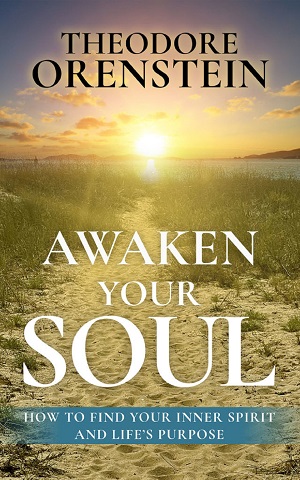
If I were to summarize Theodore Orenstein’s new book in a nutshell – it’s Believing in a Contemporary Way. The title is indicative of this, simply put the decidedly plainspoken Awaken Your Soul: How to Find Your Inner Spirit and Life’s Purpose. In the pages of Awaken Your Soul, Orenstein makes a startlingly compelling case for himself and what he believes in.
ABOUT THE AUTHOR: https://tedorenstein.com/
There are times when the read feels narratively like it’s in danger of slipping into evangelism, or some form of excess preaching and rhetoric of a specified, overtly spiritualist nature. But Orenstein is able to balance this with a most unusual angle, specifically his making his brand of theology work within a scientifically relevant, modern day context. You never get the sense Orenstein operates from a place devoid of healthy objectivity. Maybe you don’t necessarily agree with his sense of spiritual enlightenment.
But because the read never feels divorced topically or in terms of references, Orenstein is able to keep even a skeptic’s interest piqued. He also makes a compelling case for how he came to his particular brand of theology, believing all religious practices form a single whole in terms of what they allow the individual to tap themselves into. “I have learned that all true religious, humanist, and spiritual beliefs at their core contain the same reality. Some may call it higher consciousness, or absolute understanding.
Others may call it Nirvana, enlightenment, God, or other names. Once you discover it, names become irrelevant,” Orenstein writes. “It is what it is. It is indescribable, yet more real than anything you have ever experienced… It’s funny how words get in the way when people are trying to communicate. People think they disagree with one another merely because they have different definitions of the same word. In this book I am going to try to show you how to get beyond words, and connect directly with your true spirit and that of others.”
Once again, solidifying the concept of one being able to believe in a contemporary way. Orenstein doesn’t disparage timeless religion texts, he’s even quoted passages from them. But everything as far as Orenstein seems to be concerned fundamentally can be reinterpreted given each faith is less of the final word and more of a window into something beyond comprehension. How one makes sense of the mystery is something Orenstein is quick to highlight he respects, but he stands firmly by his own interpretation to boot. There’s never the sense Orenstein doesn’t ideologically have a strong opinion, and in a way he would be doing the reader a disservice if he didn’t. Because even if you don’t follow his particular spiritualist path, he’s a distinct example of how one can study numerous practices, and come up with their own, bonafide belief system.
This is evident in how Orenstein refrains from using the term ‘God’ when articulating his own belief system, stating: “I refused to use the word God while I was in the midst of enlightenment (when enlightenment was in the midst of me). I felt that in sharing my experience with others, I did not want to trigger their preconceived assumptions and opinions. The word God has separated people from one another for too long. Nonbelievers will close their minds as soon as they hear the word. For some believers there is only their concept of God, and only their way of finding God. Those who don’t believe the same way are thought to be heretical, evil, or doomed. Therefore, I was originally not going to use the word God at all in this teaching. I did not want your preconceptions to cloud, or interfere with, your openness to the ideas I will share.”
Cyrus Rhodes



























